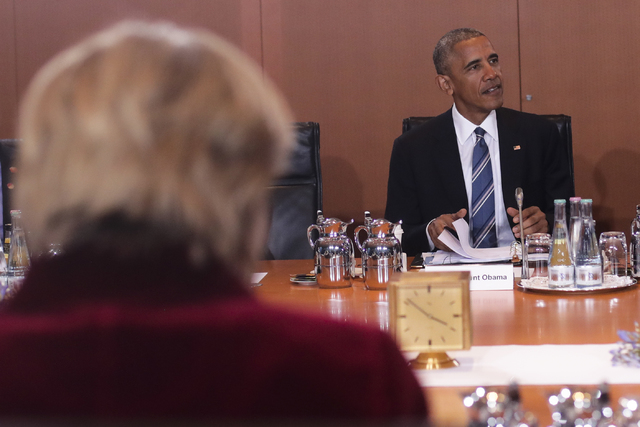BERLIN — Meeting as peers on the world stage for a final time, President Barack Obama and German Chancellor Angela Merkel on Thursday reaffirmed a message of solidarity and trans-Atlantic cooperation between top trading partners and key NATO allies as
BERLIN — Meeting as peers on the world stage for a final time, President Barack Obama and German Chancellor Angela Merkel on Thursday reaffirmed a message of solidarity and trans-Atlantic cooperation between top trading partners and key NATO allies as Donald Trump prepares to take office.
Obama is making his sixth and final visit as president to Germany, where he has been popular since even before he was elected. His eight years in office have helped erase much of the anti-American sentiment that had grown during the administration of George W. Bush over the Iraq war and other policies.
Merkel, who worked well with Bush before Obama’s election, dined with Obama on Wednesday night at his hotel and the two planned a news conference after their morning meeting. The downtown area around the Chancellery and hotel where Obama was staying was locked down tightly, with some 2,400 police officers at road blocks and checkpoints.
A joint opinion piece published Thursday in Germany’s weekly business magazine WirtschaftsWoche seemed directed as much at the incoming Trump administration in the U.S. as at European nations. In it, the two leaders stressed that the “underlying bedrock of our shared values is strong” even if the pursuit of common goals is sometimes gone about differently.
Obama and Merkel noted that European Union-U.S. trade was the largest between any two partners worldwide, and emphasized that the trans-Atlantic friendship has helped forge a climate accord, provide help for refugees worldwide, form a collective defense under NATO, and strengthen the global fight against the Islamic State extremist group.
“That friendship is based on our shared commitment to personal freedom and dignity, which only a vibrant democracy under the rule of law can guarantee,” the leaders wrote.
Trump, in contrast, has called climate change a “hoax” and said the climate accord should be renegotiated.
He promised to tighten rules for accepting refugees, complained the U.S. was paying more than its share to support NATO and has sharply criticized the U.S. strategy for fighting IS.
Merkel and Obama have enjoyed a close relationship over the years, and Obama seems to be counting on the German leader’s strength to help counter the isolationist tone voiced by President-elect Trump during the election campaign.
Although the relationship hit a bump in 2013 when it was revealed the U.S. National Security Agency had been monitoring the chancellor’s cellphone, tensions were smoothed over after Obama acknowledged Germany’s anger and promised new guidelines for monitoring.
The mood for Obama’s latest visit was significantly tamped down compared with his first visit to the German capital in 2008, when some 200,000 exuberant fans packed the road between the landmark Brandenburg Gate and Victory Column to hear the then-candidate, in a speech that solidified his place on the world stage.
Obama told Berliners then that progress requires sacrifice and shared burdens among allies.
“That is why America cannot turn inward,” Obama told the cheering crowd. “That is why Europe cannot turn inward.”
Eight years later, his words seem to have foreshadowed the nationalist, isolationist forces gaining traction in some parts of Europe and punctuated by Trump’s victory in the U.S. election.
In Germany, officials hope the change in presidents will not bring about a significant shift in relations between the two nations or the NATO alliance.
“The Americans are among … our most important partners and we want to continue this partnership economically, politically and through shared values,” Peter Tauber, the general secretary of Merkel’s Christian Democratic Party, told reporters in Berlin, before Obama’s visit.
“I think one will see that Mr. Trump will have his own political suggestions, but that the USA won’t be a different country tomorrow.”
In Berlin, Obama
will also meet today
with the leaders of France, Italy, Spain and Britain.
Merkel already talked with Trump by phone after his election, offering him Germany’s “close cooperation,” but emphasized it would be on the basis of what she said were shared values of “democracy, freedom, respect for the law and for the dignity of human beings, independently of origin, skin color, religion, gender, sexual orientation or political views.”



